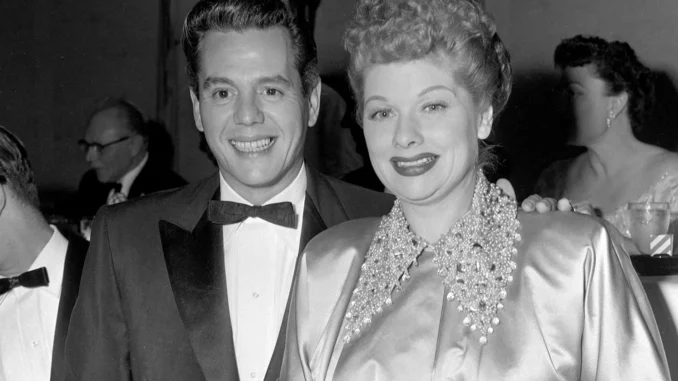
Lucille Ball was one of Hollywood’s most beloved stars — a comedic genius whose groundbreaking sitcom I Love Lucy changed television forever. But behind the laughter and studio lights, Ball’s personal life was far more complicated. After her highly publicized divorce from Desi Arnaz in 1960, she found love again with Gary Morton, a stand-up comedian and producer. While Morton brought stability to her later years, many have wondered what Lucille truly thought of his parenting — especially in comparison to her first husband’s.
A New Chapter After Desi Arnaz
Lucille Ball and Desi Arnaz were one of Hollywood’s most iconic couples — on and off the screen. Their chemistry powered I Love Lucy, but behind the scenes, their marriage was turbulent. Desi’s infidelity and heavy drinking led to years of tension, and by 1960, Lucille filed for divorce, citing “extreme cruelty.”
After years of emotional chaos, she longed for peace. She met Gary Morton the following year, and they married in 1961. Morton, though 13 years younger, offered Lucille the stability and calm she had been missing. He wasn’t a global star like Desi, but he understood show business and admired Lucille’s strength rather than competing with it.
However, one question often arose — how did Gary fit into Lucille’s life as a mother to her two children, Lucie Arnaz and Desi Arnaz Jr.?
Lucille’s Protective Motherhood
Lucille Ball was a devoted mother. Despite her grueling work schedule, she was determined to give her children a sense of normalcy that she never had growing up. Her kids often spoke about how “mom ran the house like a studio” — organized, structured, and full of laughter, but also with high expectations.
When Gary Morton entered their lives, Lucille was protective. She didn’t want a new stepfather to disrupt the close bond she had with Lucie and Desi Jr. But according to family friends and later interviews, Morton handled the situation with grace. He didn’t try to replace their father — instead, he respected the boundaries and earned their trust slowly.
Lucille on Gary’s Parenting: ‘He Wasn’t Trying to Be Their Dad’
In rare interviews during the 1970s, Lucille Ball spoke candidly about her second marriage. When asked about Gary’s relationship with her children, she said:
“Gary never tried to be their father. He didn’t have to. He was just there — supportive, kind, and steady. That’s what we needed.”
Lucille appreciated that Gary took a backseat in parenting decisions, allowing her to maintain her role as the authority figure. While Desi Arnaz Sr. remained involved in the children’s lives, Lucille valued Gary’s quiet presence and the sense of security he brought to their family.
Lucie Arnaz later echoed her mother’s sentiment, describing Morton as “a good man who treated my mom with respect” and “a solid figure” in their household. Although Gary didn’t share the same kind of bond that Lucie and Desi Jr. had with their father, he was considered part of the family’s emotional foundation.

Different Fathers, Different Styles
Desi Arnaz Sr. was a passionate, fiery man — larger than life, with an instinct for drama and charisma. Gary Morton, on the other hand, was measured, calm, and practical. Lucille reportedly admired this contrast. She once said in an interview:
“Desi taught me how to dream. Gary reminded me how to rest.”
That difference extended to parenting. Desi was indulgent and affectionate, but his career and lifestyle often made him an inconsistent presence. Gary, meanwhile, was steady but not overly involved. He attended family gatherings, offered advice when asked, and made sure Lucille never felt alone in raising her children — even if he wasn’t hands-on like a traditional stepfather.
The Kids’ Perspective
In later interviews, Lucie Arnaz revealed that while Gary was never a father figure in the emotional sense, he was deeply respected. He supported both children’s early careers in entertainment — Lucie as an actress and singer, and Desi Jr. as a musician.
Lucie shared in a 2019 interview that Gary “made my mother laugh again,” something she hadn’t seen in years after the difficult end of her marriage to Desi. That, she said, was more important than anything else: “He took care of her heart. And in doing that, he took care of all of us.”
Lucille’s Later Reflections
By the 1980s, as Lucille looked back on her life, she often credited Gary Morton with giving her a sense of balance. In her autobiography, Love, Lucy, she mentioned that while Gary wasn’t the kind of man to command attention like Desi, he was dependable — someone she could rely on without fear of chaos or scandal.
She once said privately to a friend, “Desi was the fireworks. Gary was the sunrise.”
That statement summed up her view of the two men: one passionate but unpredictable, the other calm and enduring. And when it came to parenting, Lucille saw value in both. Desi gave the kids charisma and creativity; Gary gave them stability and warmth.
A Legacy of Love and Balance
Lucille Ball passed away in 1989, but her legacy as both an entertainer and a mother endures. Those close to her say she left this world grateful for the second chance at love that Gary Morton gave her.
While she never expected him to fill Desi Arnaz’s shoes, she respected the way he supported her children — quietly, without fanfare. For Lucille, that was the greatest form of parenting: showing up, standing steady, and letting love lead the way.
In the end, I Love Lucy wasn’t just a show — it was a reflection of Ball’s deepest truth: that love, in all its imperfect forms, was always worth fighting for.